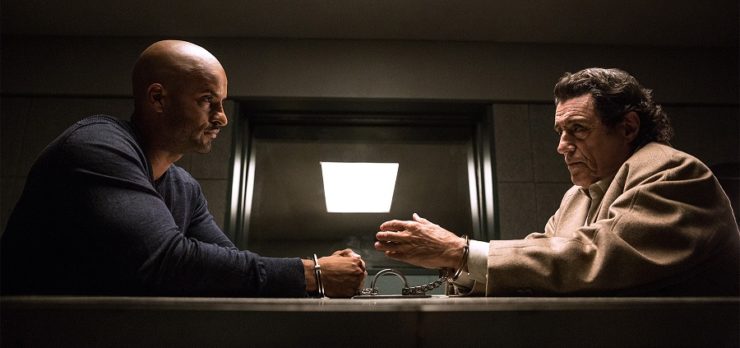From gods to mortals, everyone in “Lemon Scented You” is so deep in denial that they’ve begun to believe their own lies. But where the earlier episodes were content to let the characters shut their eyes to the truth, the fifth episode straps them down and forces them to see the horror of reality.
Anthropologically speaking, I’m unsure about that “Coming to America” sequence. While we know little about the belief systems of paleolithic Paleoamericans, they were likely animistic, as is common amongst Indigenous cultures. Yet by having the mammoth god of the Old World elders being replaced by the New World buffalo god, the show implies monotheism or at the very least henotheism. Moreover, whole communities migrated across Beringia, a cold but not snow-encased land bridge full of flora and fauna, and lived there long enough to become distinct from their Asian ancestors. Some studies put human habitation of Beringia at 15,000 years. If Atsula (voiced by Yetide Bedaki) and her people arrived in the New World late enough to meet an already established people, not only should they have encountered other communities on the way but it’s even more doubtful that they were the first ones to bring Nynyunnini over.
Portraying a Paleoamerican band as a starving people who are half-naked save copious amounts of decorative gewgaws and are traipsing about lifeless landscape while also carting around a mammoth skull totem doesn’t sit well with me. I get that it’s an ancient story told third hand by an old god. It’s supposed to be fantastical, hence the gorgeous animation. And sure, the Vikings arriving in North America was just as unrealistic. But to me, this feels a little too close to the racist trope of portraying Indigenous people as scantily clad noble savages.
However, it does set up the rest of the episode’s thesis of gods replacing gods. Wednesday, Anansi, and Czernobog aren’t the first gods to face oblivion at the hands of the next generation of deities, but they may be the first ones to fight back. The mammoth god understood that in order for his people to survive in a new land, they had to let go of their old ways. Yet Wednesday isn’t the kind of god to sacrifice himself for the good of his followers. He, as the very first “Coming to America” showed, makes his worshipers come to him.
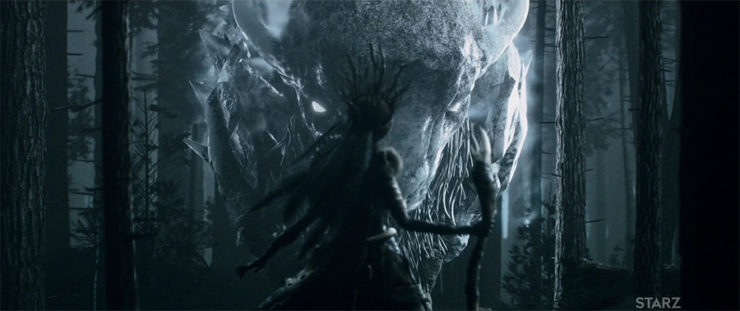
Enter Laura. This episode picks up where the last left off. Although the star-crossed lovers are together at last, we rarely see them in the same frame. They are together initially, then broken apart as Laura explains her life and death. They don’t share a frame again until Shadow leaves for a smoke break. And back in the bathroom they’re separated again until they kiss. Shadow almost buys into Laura’s fairytale, into the story she’s convinced herself is true, that they can be happy together. That love conquers all. But despite everything Laura says, her tone betrays her.
After getting a second chance at life, Laura has decided to do right with Shadow where before she only did wrong. Except all those wrong actions were her true nature. Zombie or no, she will never love Shadow the way he loved her. She’s reframed her life with Shadow at the center, but fondness and gratefulness do not true love make.
We see it early on when they first reunite, how she talks to him with the same tone she used when she convinced him to rob the casino. It’s a soft, pleasing tone couched in words that allow no room for disagreement. It sounds like a choice but it’s really a command. When she invites Shadow to sit on the bed next to her, it’s less an ask than an order, and she is surprised when he stops himself. Puppy doesn’t resist or refuse. Puppy snuggles and cuddles and whispers sweet nothings in her ear. Puppy doesn’t yell at her or refuse to touch her. She gets a little agreement out of him when he goes to get her cigarettes—note that small, victorious smile on her face—but it doesn’t last. She gets in the bath because she assumes she’s already won.
It’s hard to tell at the end of the episode how she feels about Shadow leaving her (albeit unwillingly). She is too stubborn to walk away from him, but whether she’ll track Shadow down to force him to take her back or to punish him for rejecting her is still up in the air. Thing is, throughout all this, Laura still has failed to take into consideration Shadow’s feelings. She thinks only of herself, of what she wants. What Shadow needs doesn’t factor into her decisions. I don’t think she’s even thought about his feelings. She doesn’t ease him into anything or try to talk out their problems. She goes straight to “Are you still my Puppy?” with the presumption that the answer will be “yes.” The possibility of Shadow balking at her reconciliation didn’t even occur to her, but it hurt her more than I think even she thought it could.
That moment when Shadow’s light vanishes and she’s left alone in the bathtub. She’s finally, possibly for the first time in her life, stripped bare literally and metaphorically. She was completely honest with Shadow about everything, lied about nothing. Her love story is a fantasy, but she believes it to be the truth. She opened herself up to Shadow the way he once did to her, and then for her to watch him disappear was devastating. However she feels about his supposed abandonment, death has left her cold in more ways than one. She’s flat out mean to Mad Sweeney, and her unintentional murder of the morgue attendant doesn’t even draw out a shrug. In life she was self-centered, in death selfish.
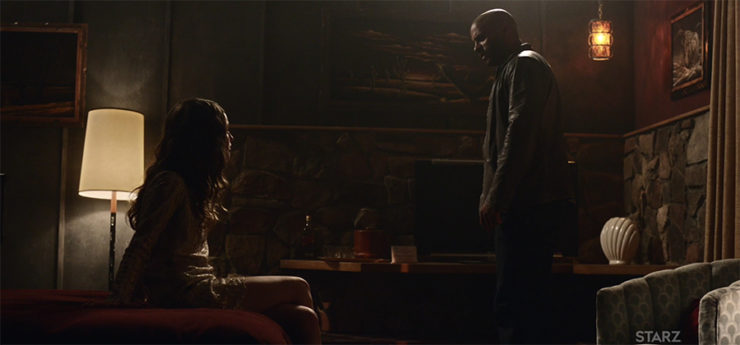
Media isn’t just entertainment; she’s a collective fantasy. Whether it be books, television, movies, the internet, newspapers, magazines, as long as it is a wide-reaching means of communication, however frivolous or serious, it falls under her parameters. Her infinite aspects are derived from the pop culture created and nurtured by the media, as well as the very definition of her name: the word “media” is a plural most often used as a singular. She is one and she is many and she is everywhere. She is smart enough to know when shit is about to go down and clever enough to join the side most likely to win.
David Bowie is the perfect iteration for her during her tetchy conversation with Technical Boy—a shapeshifting, androgynous figure at the height of coolness and conspicuousness. Technical Boy thinks he’s awesome, but contrasted with Ziggy Stardust he’s a skinny little brat with a bad hairdo and an attitude problem. Later, she takes the form of Marilyn Monroe from Seven Year Itch as a way to entice Wednesday and Shadow. She pouts, poses, and giggles as she offers the enticement of a male sexual fantasy. Media sells the fantasy so hard that not only does Shadow almost buy it, but he’s surprised when she stops floating and leaves with a disinterested air.
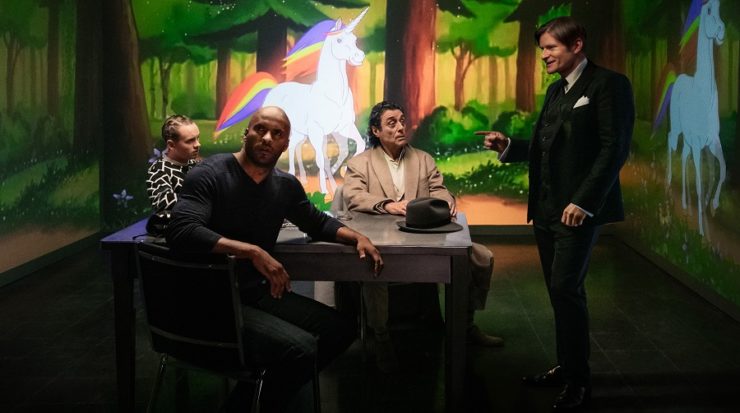
This is one of those episodes perfect for fans who’ve read the book. Everything from Mr. World’s (Crispin Glover) particular phrasing, the way he hovers around Wednesday, the look Wednesday gives to Shadow at the mention of his mother. “You keep on letting him go!” “This man deserves our respect.” Truth be told, I’m having a helluva time writing these reviews without spending too much time talking about the massive yet subtle differences between the book and show and the winks and nods to plot points further down the line. Suffice it to say, there’s layers and layers of more going on with the gods in that interrogation room than meets the eye.
If nothing else, the scenes between the New Gods show that there’s strife in their camp. Media and Technical Boy aren’t in charge but are ranked below Mr. World, yet even that hierarchy seems shaky at best. Mr. World is fright and might with a dash of all-seeing. Director Vincenzo F. Natali and cinematographer Darran Tiernan shoot Mr. World from uncomfortable angles. His head is always steady and centered but the background wobbles around him. It’s delightfully disorienting. Despite being older than Mr. World and Technical Boy (or, at least it’s implied that she is), she bows to him because his power outstrips hers. Yet even still, she’s the one keeping the plan on track. She hassles Technical Boy into apologizing. She pulls Mr. World out of his little flash of self-absorption.
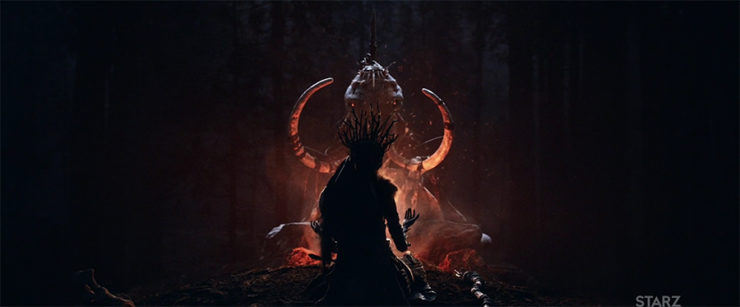
While last night’s episode was short on character development and plot, it was a tower of exposition and haunting imagery. This was an hour of place setting, pretty though it was. Any lingering questions from earlier episodes were wrapped up, but only so the show could put them in a larger and much more confusing context. We’re just past the halfway mark of the first season, and it’s clear American Gods ain’t messing around.
Final Thoughts
- “Gods live and gods die.”
- “Hey, baby. The fuck you doing here?”
- “I’m sorry for lynching you.”
- “I’m not your enemy.” There’s a lotta truth in that lie.
- Haven’t talked about it yet, but holy hell, that opening title sequence is astounding.
- This is the first episode of the season written by someone other than Bryan Fuller and Michael Green, and it shows. David Graziano has been a producer on the show, but it still feels not Fuller/Green.
- Laura reveals that sleeping with Robbie after her cat died wasn’t an accident. She thought about it repeatedly before finally giving herself the excuse to go ahead. Puts things in a new light.
- The sun coin is inside Laura, a fascinating and potentially very gross change from the book.
- During their limo conversation, Media and Technical Boy make it clear Shadow is more powerful and important that we realized. Wednesday doesn’t need everyone to believe in him. Just one. Just Shadow.
- Fun fact! Shadow’s room number is the page in the book where he sees zombie Laura for the first time.
- The poem Wednesday recites in the police station is “Madam Life’s a Piece in Bloom” by William Ernest Henley.
- The tree thing in the police station is Mr. Wood. There are three other Spooks referenced in the book—Mr. Stone, Mr. Town, and Mr. Road—and they work for Mr. World.
- Media and Technical Boy aren’t in charge but are ranked below Mister World. They make it clear Shadow is more powerful and important that we realized.
- Hey look! It’s Tracie Thoms, aka Mahandra McGinty of Wonderfalls.
- Poor Mad Sweeney, he’s not having a good day.
*** Given the mass amount of hints at the book’s finale in this episode, this is a reminder to TAG YOUR SPOILERS in the comments. ***
Alex Brown is a teen librarian, writer, geeknerdloserweirdo, and all-around pop culture obsessive who watches entirely too much TV. Keep up with her every move on Twitter and Instagram, or get lost in the rabbit warren of ships and fandoms on her Tumblr.










